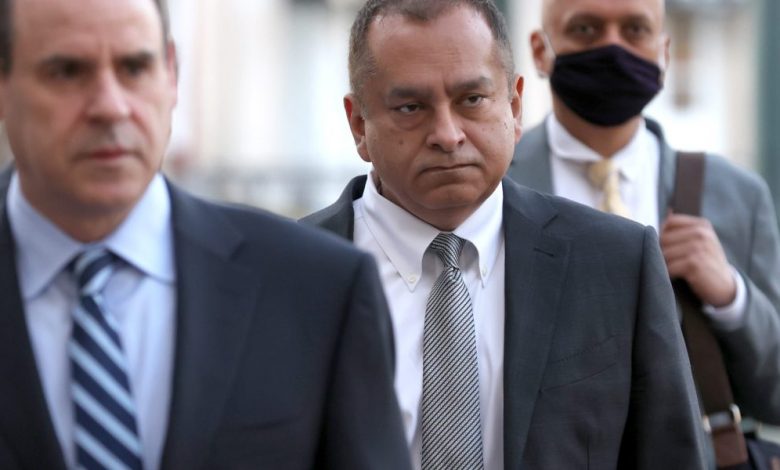Elizabeth Holmes’ ex-lover Ramesh Balwani sentenced to nearly 13 years in prison for role in Theranos scandal

Former Theranos executive Ramesh “Sunny” Balwani was sentenced Wednesday to nearly 13 years in prison for his role in the company’s blood test scam — a slightly longer sentence than the CEO who was his lover and accomplice in one of Silicon Valley’s biggest scandals.
Balwani was convicted in July of fraud and conspiracy related to the company’s counterfeit medical technology that duped investors and put patients at risk. His conviction comes less than three weeks after Elizabeth Holmes, the company’s founder and CEO, received more than 11 years in prison for her involvement in the scheme, which has been analyzed in a book, an HBO documentary and an award-winning television series.
Balwani’s sentence was less than the 15 years demanded by federal prosecutors, who portrayed him as a ruthless, power-hungry figure. But it’s a lot longer than the four to 10 months his lawyers are aiming for.
The scandal centered around the company’s false claims of having developed a device that can check for hundreds of diseases and other potential problems with just a few drops of blood drawn with a finger prick.
After years of promoting the technology, Holmes and Balwani were warned that the blood tests were inaccurate, but they continued to raise money from investors, including billionaires like software magnate Larry Ellison and media magnate Rupert Murdoch, and deployed the technology in some Walgreens stores.
US District Judge Edward Davila said Balwani’s financial statements were “not just projections, they are lies” and “a true flight from honest business practices.”
The case shed a bright light on the dark side of Silicon Valley and revealed how its culture of hype and boundless ambition could turn to lies.
Both Holmes, 38, and Balwani, 57, could have faced up to 20 years in prison. Balwani spent six years as Theranos’ chief operating officer and remained romantically involved with Holmes until a bitter split in 2016.
Former federal prosecutor Amanda Kramer said the harsher sentence seemed appropriate because the jury in Balwani’s trial convicted him on all counts, while the jury in Holmes’ separate case acquitted her of some charges and convicted her of others.
“It’s not surprising that he got a tougher sentence because his misconduct was more serious,” Kramer said.
During her trial on the witness stand, Holmes accused Balwani of manipulating her through years of emotional and sexual abuse. Balwani’s lawyer has denied the allegations.
Federal prosecutors also want the judge to order Balwani to pay $804 million to defrauded investors — the same amount sought by Holmes. Davila deferred a decision on restitution to a later hearing, just as he did during Holmes’ sentencing on November 18, when she was sentenced to 11 1/4 years in prison.
In court documents, Balwani’s lawyers portrayed him as a hard-working immigrant who moved to the United States from India in the 1980s to become the first member of his family to attend college. In 1990 he graduated from the University of Texas with a degree in Information Systems.
He later moved to Silicon Valley, where he first worked as a computer programmer for Microsoft before founding an online startup that he sold for millions of dollars during the dot-com boom of the 1990s.
Balwani and Holmes met around the same time she dropped out of Stanford University in 2003 to found Theranos. He was enthusiastic about her and her quest to revolutionize healthcare.
Balwani’s attorneys said he ended up investing about $5 million in a stake in Theranos that ended up being worth about $500 million on paper — a fraction of Holmes’ one-time fortune of $4.5 billion .
That wealth vanished after Theranos began to unravel in 2015, when it was revealed that its blood-testing technology never worked, as Holmes boasted in glowing magazine articles comparing it to Silicon Valley visionaries like Apple co-founder Steve Jobs.
Prior to Theranos’ demise, Holmes partnered with Balwani to raise nearly $1 billion from well-funded investors.
“Mr. Balwani is not the same as Elizabeth Holmes,” his attorneys wrote in a memo to the judge. “He has actually invested millions of dollars of his own money; he never sought fame or recognition; and he has a long history of whom.” to help those less fortunate.” Balwani’s attorneys also claimed that Holmes was “dramatically more culpable” for the Theranos scam.
Echoing similar claims made by Holmes’ attorneys before their sentencing, Balwani’s attorneys also argued that he was appropriately punished by the intense media coverage of Theranos.
Balwani “has lost his career, reputation and ability to return to meaningful work,” his attorneys wrote.
Federal prosecutors are accusing Balwani of being a ruthless, power-hungry accomplice in crimes that have ripped off investors and endangered people who achieved flawed results. The blood tests were to be available through a partnership with Walgreen’s, which Balwani helped develop.
“Balwani presented a fake story about Theranos’ technology and financial stability in meeting after meeting day after day,” prosecutors wrote in their memo to the judge. “Balwani maintained that facade of achievement after making the calculated decision that honesty would destroy Theranos.”
Our new weekly Impact Report newsletter explores how ESG news and trends are shaping the roles and responsibilities of today’s leaders. Subscribe here.



